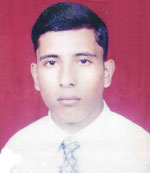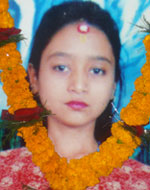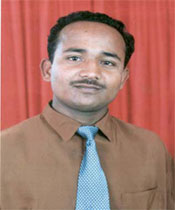Related Links
Case Updates
Krishna Adhikari
 On 6 June 2004, Krishna Prasad Adhikari, a resident of Fujel village of Gorkha District, was murdered in Chitwan District by Maoist cadres. Krishna Prasad was visiting his grandparents after having taken the SLC examinations, and he was abducted from Bakullahar Chowk by men who came on a motorcycle ...
On 6 June 2004, Krishna Prasad Adhikari, a resident of Fujel village of Gorkha District, was murdered in Chitwan District by Maoist cadres. Krishna Prasad was visiting his grandparents after having taken the SLC examinations, and he was abducted from Bakullahar Chowk by men who came on a motorcycle ... Maina Sunuwar
 Around 6 am on February 17, 2004, a group of RNA soldiers arrested Ms
Maina Sunuwar, a 15-year-old schoolgirl of Kharelthok VDC-6, Kavre
district. She disappeared since her arrest. Her family members, with
support from villagers and school where Maina was a student, visited
detention centers ...
Around 6 am on February 17, 2004, a group of RNA soldiers arrested Ms
Maina Sunuwar, a 15-year-old schoolgirl of Kharelthok VDC-6, Kavre
district. She disappeared since her arrest. Her family members, with
support from villagers and school where Maina was a student, visited
detention centers ... Sanjeev Kumar Karna
 Sanjeev Kumar Karna was one among the 11 persons arrested on October 8, 2003. On that fateful day, they had gone to attend a picnic program organized by the students at a place called Kariyachauri VDC-4, and from picnic, they went to Kataiya Chowri Area of Dhanusha district where they ate some food ...
Sanjeev Kumar Karna was one among the 11 persons arrested on October 8, 2003. On that fateful day, they had gone to attend a picnic program organized by the students at a place called Kariyachauri VDC-4, and from picnic, they went to Kataiya Chowri Area of Dhanusha district where they ate some food ... Arjun Bahadur Lama
Hari Prasad Bolakhe
Sarala Sapkota
Birendra Shah
Bishwanath Parajuli, Tom Nath Poudel and Dhan Bahadur Tamang
Chot Nath Ghimire and Shekhar Nath Ghimire
Bhauna Tharu
Media Workshop on Transitional Justice and Sensitive Reporting on CRSV Issues Concluded
On the first day of the workshop, Senior International Legal Advisor for the ICJ Dr Mandira Sharma, Conflict Victim Women National Network Vice-Chairperson Gita Rasaili and Kantipur TV Editor-in-Chief Bijay Paudel gave individual presentations.
In her presentation, Dr Sharma set out the context of transitional justice in Nepal and commented on the strong and weak aspects of the transitional justice (TJ) bill passed by the parliament. She emphasised the media's role in raising the issues of conflict victim women's access to relief and reparation. She urged the participating journalists to report on TJ Commissions' handling of conflict-related sexual violence cases.
Rasaili's presentation focused on the status of TJ and the challenges encountered by conflict victims in getting justice. She put forth victims' reservations on the flawed TJ bill and requested the journalists to be sensitive while reporting the cases of the victims of sexual violence.
Paudel, in his presentation, provided the background of transitional justice in Nepal and focused on the do's and don'ts in reporting sexual violence. He emphasised the role of journalists in making the state more accountable to victims and urged the media persons to be victim-centric.
On the second and last day of the workshop, National Legal Advisor for the ICJ Advocate Laxmi Pokharel, Onlinekhabar.com Editor-in-Chief Shiva Gaule, Samakon Samvad Presenter and Media Personality Nirmala Sharma, South Asian Women in Media Vice-President Namrata Sharma and Sancharika Samuha Secretary Durga Karki gave individual presentations.
Pokharel's presentation focused on Gender Concerns in Nepal's Transitional Justice Process. She explained with a gender lens the positive and negative aspects of the TJ Bill passed by the parliament. She encouraged the women journalists to produce investigative stories about victims of conflict-related sexual violence.
Gaule, in his presentation, urged the participating journalists to find issues in events to build in-depth stories and continue writing victim-centric stories even if there would be reputational and other kinds of attacks on media persons.
Nirmala Sharma pointed out the lack of inclusive representation of women in news stories as sources. Saying that the whole media landscape is skewed in favour of men, she urged women journalists to incorporate women's voices in media content.
Namrata Sharma's presentation focused on Ethical and Sensitive Reporting on Gender Issues: Importance of Sensitivity in Reporting on Transitional Justice and Women Peace and Security Issues, Guidelines for Ethical Reporting and Maintaining Confidentiality. Providing examples from her own long experience as an investigative reporter, Sharma talked about the principles that guide the conduct of ethical research. She requested journalists to report stories through a gender equality and social inclusion (GESI) lens.
Karki, in her presentation, delved into the strategies that women journalists can make while covering TJ issues and floated the idea of building a network of journalists for sharing information and streamlining investigations.
Participating journalists carried out group work in building strategies to cover TJ and women's issues and a member from each of the groups gave a short presentation.
A total of 15 women journalists participated in the workshop.
























Join Us